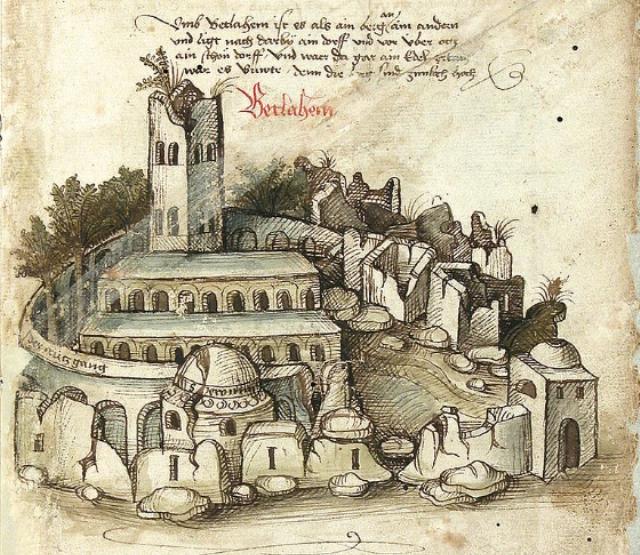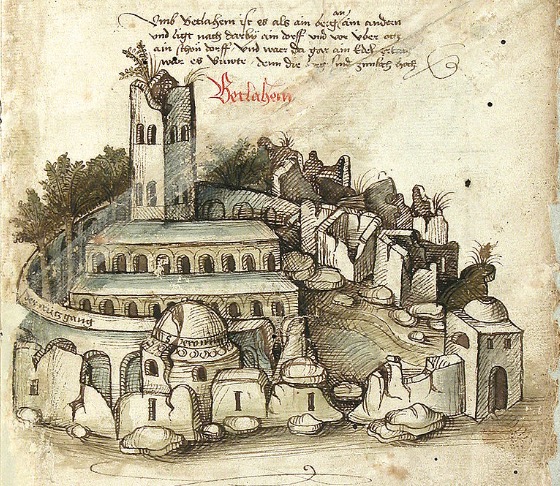

Public domain
Currently, one of the holiest places for the Christian faith—and an important place to Judaism and Islam—languishes under Fatah control in the West Bank.This plan of action will revitalize the city and environs of Bethlehem by transforming it into an international site that recognizes its global significance as Jesus’s birthplace. It’s a reasonable model, especially considering that there are historical precedents for doing this.
Bethlehem is an Arab-dominated town about six miles south of Jerusalem. It’s approximately 4,100 square miles are home to around 28,000 people. But of course, it’s much more than just another Middle Eastern town.
For Jews Bethlehem is part of the “Promised Land” in the region of Judaea (part of the West Bank of the Jordan River). Jews also believe that Bethlehem is the birthplace of the most iconic King of Israel, David.
<img alt captext="Public domain” height=”451″ src=”https://conservativenewsbriefing.com/wp-content/uploads/2024/08/a-plan-to-revitalize-bethlehem.jpg” width=”520″>
Image: Bethlehem’s Church of the Nativity in 1487 (cropped) by Konrad von Grünenberg, Public domain.
For almost two millennia, Bethlehem has been caught between two worlds in what seems like an eternal conflict. After the Roman’s conquered Judea in 135 C.E. (when they renamed the region “Palestine” as an insult to the Jews), the vast majority of Jews were scattered to many far-off lands. However, some never left. For several decades after Theodor Herzl proposed that the world’s scattered Jews return to their homeland, Jews began to purchase land (they never stole it), both when the Ottoman Empire controlled Syria-Palestine and when the British took control under the Mandate.
After WWII, under the 1947 UN Partition plan, the UN Special Committee on Palestine (“UNSCOP”) recommended dividing the former mandate between Jews and Arabs, with both Jerusalem and Bethlehem and the lands in between getting set aside as a special internationally administered enclave. Jews accepted this proposal. The Arabs rejected it and, instead, prepared to annihilate the new Jewish state.
The reason for the world’s interest in Bethlehem is obvious. For Christians, Bethlehem is central to the life of Jesus, the man Christians believe is the Jewish Bible’s long-promised Messiah. For them, Jesus is the Christ (The Anointed One) who is God The Father, the incarnation of the divinity, the very Yahweh of the Torah. The Christian Gospels of Matthew 2 and Luke 2 assert that Jesus was born in Bethlehem of Judaea. The Catholic Christian Church of Nativity in Bethlehem is built above the traditional site of the birthplace of Jesus.
For Muslims Bethlehem is also celebrated as the birth of Isa (Jesus), recognized as a prophet of Allah. Muslims also revere Miriam (Mary), the mother of Jesus. Islam’s scripture, the Koran, even has a Surah (Chapter 19) dedicated to Mary, entitled “Miriam.” Muslims also accept the miracle of Jesus’s Virgin Birth.
Following the partition and during the 1948 Israeli War of Independence, Jordan gained control over both Bethlehem and Jerusalem. In 1967, after its victory in the Six-Day War, Israel conquered both of those cities, allowing Jews for the first time in almost 20 years to return to their most holy spot, the Western Wall in Jerusalem. Under the 1993 Oslo Accords, while Israel would not (and will never) give up control of Jerusalem, it ceded Bethlehem to the Palestinian Authority.
The Muslim world celebrated this aspect of the Oslo Accords. Muslims wanted it to diminish the Christian presence in the region. The Clinton Administration went along, either out of indifference or because it supported that goal. It was a tragic mistake that needs rectification.
This secession helped transform this once almost entirely Christian enclave into a city where only about ten percent of the population is Christian faith today. Many Christians fled due to harassment by the Muslim majority, as well as the Israeli decision to erect a high-security wall between Bethlehem and surrounding Jewish settlements to prevent murderous attacks on those settlements. This security wall has been an obstruction to the city’s economic progress.
Bethlehem is important beyond its religious significance. Christianity, like Judaism, is a stabilizing force. Both have grown beyond the use of the sword as a political means. That is not the case with Islam. Muslims have been aggressively targeting Christians for extinction in the Middle East and elsewhere. The world’s Christian (and, in Europe and America, post-Christian) community has failed to rescue the world’s beleaguered Christians, nor have they made any move to preserve Christ’s birthplace.
The Islamic push to erase a Christian presence in Bethlehem could be halted by having the UN impose on the city a governing council composed of the major Christian faiths with a rotating head changed every two to four years. The rules of governance would be set out in a charter to allow consistency of law to facilitate a thriving local economy, along with access and protection for residents and visitors.
To facilitate returning Christian citizens to the city, there would need to be a fund established to purchase sufficient property for residential and commercial purposes, as well as for churches. Funding would best be served by contributions from the international community. Initially, security must come from Israel and America. The potential peace dividends make it worthwhile.
This proposal will necessarily need the support of the World’s Abrahamic Religions, Christianity, Islam, and Judaism, but there are historical precedents. As noted, UNSCOP already proposed an international controlling body for Bethlehem. There are other historical examples of open cities, such as the Free City of Trieste. The city was incorporated into the Hapsburg Austrian Empire but maintained its “Free City Status.” Trieste lost its “Open City Status” only in 1954 when it was subsumed into the Italian nation-state.
Signaling that Bethlehem is a center where the three Abrahamic faiths can co-exist will breathe new life into this world religious site. The rare model of Islam cooperating with Judaism and Christianity could add stability to a region in sore need of it.





